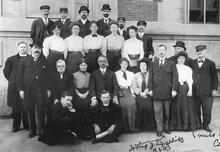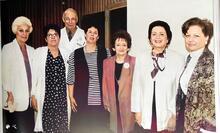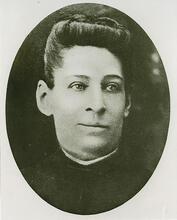Edith Altschul Lehman
Edith Altschul Lehman juggled her responsibilities as a political wife, a mother, and a volunteer for important causes. Alongside her husband, New York governor and United States senator Herbert Lehman, Edith believed in the importance of trade unions, good public schools, and decent housing. She volunteered for the Henry Street Settlement and the Play Schools Association, helped found the Mount Sinai Hospital’s social service department, and fundraised for United Jewish Appeal, inspiring an Israeli high school to be built in her honor. Together, the Lehmans built the Central Park Children’s Zoo. After Herbert’s death, Edith created projects in his honor, including the Mount Sinai Medical School, the Lehman Fund for African American college students, and the Lehman School of Ethics at the Jewish Theological Seminary.
Although she preferred to be addressed as Mrs. Herbert H. Lehman, and often insisted that marriage was her career and family was the greatest interest in her life, Edith Altschul Lehman’s public persona reflected her commitment to social causes. Known to many only as the cultured wife of one of New York’s most popular governors and senators, she was in her own right a passionate social activist and philanthropist, although much of her philanthropy was not made public.
Early life: San Francisco, New York, and marriage
Edith Altschul Lehman was born in San Francisco on August 8, 1889, the eldest of three children. Her parents, Charles and Camilla (Mandlebaum) Altschul, were members of the wealthy and cultured Jewish aristocracy of the city. Charles Altschul, born in London to American parents and educated in Germany, had migrated to San Francisco in 1877 and had become a successful banker.
When Edith was eleven, her father moved the family to New York to take a position in the investment firm of Lazard Frères and Company. She attended Dr. Sachs’ Girls School and Miss Jacoby’s (later Calhoun) School. As a teenager, she accompanied her parents on their frequent trips abroad, where she eagerly absorbed European culture.
At eighteen, she chose not to attend college, but to study nursing instead. Her plans changed, however, when she met Herbert Lehman, the thirty-one-year-old member of a very influential New York family and a partner in the Lehman Brothers investment firm. They were married on April 28, 1910.
The young couple had much in common. They came from families with traditions of giving aid to welfare and religious causes. They shared concerns for decent government, better schools and housing, and strong trade unions, and had great faith in the government’s ability to address these social conditions.
A turn to volunteerism and politics
Early in their marriage, Herbert Lehman turned his attention to a political career and Edith Lehman to volunteerism. Her success in organizing a lay social service committee to take care of the family needs of hospitalized patients led to the establishment of Mount Sinai Hospital’s first professional social service department and to her many years of association with the hospital. She was involved in two other institutions that would also become lifelong causes: the Henry Street Settlement, founded to improve conditions of life on the Lower East Side, and the Play Schools Association, organized to care for children of working mothers.
The Lehmans became the parents of Peter (b. 1917), John (b. 1920), and Hilda (b. 1921). For Lehman, who delighted in her roles as mother and activist, there was yet another role to assume in 1928—political wife. Throughout her husband’s long public career as lieutenant governor and governor of New York, as a United States senator, and as a leader in Democratic politics, Edith Lehman described herself as an innocent bystander who “tagged along with him.” Nevertheless, after Herbert Lehman’s death in 1963, Democratic politicians continued to call at the Lehman home for advice and endorsements. It was a testimony to Edith Lehman’s keen intelligence and astute political savvy.
Jewish and non-Jewish philanthropy
While lax in their religiosity, assimilated American Jews of Lehman’s generation were faithful to the dictum that “all Israel are responsible for one another.” Although she did not attend her first A seven-day festival to commemorate the Exodus from Egypt (eight days outside Israel) beginning on the 15th day of the Hebrew month of Nissan. Also called the "Festival of Mazzot"; the "Festival of Spring"; Pesah.Passover until 1959, Lehman was, from a young age, deeply interested in Jewish communal affairs. A staunch supporter of Israel, she made her first trip to the country in 1949, traveling on a refugee ship from Marseilles with her husband.
In recognition of her assiduous work as a fund-raiser and as a benefactor to the United Jewish Appeal and the Federation of Jewish Charities of New York, the Edith Lehman High School in Dimona, Israel, was built by the Women’s Division and dedicated to her.
The Lehmans balanced their philanthropy between Jewish and non-Jewish causes. They built Pete’s House in 1948, an addition to the Henry Street Settlement, as a gift to the children of the neighborhood, and dedicated it in memory of their son Peter, who had been killed in World War II. In 1961, they built the Children’s Zoo in Central Park.
After her husband’s death, Lehman’s larger philanthropic works were dedicated to him: the establishment of the Mount Sinai Hospital Medical School and the Lehman Professorship in Pediatrics; the Lehman Educational Fund for Afro-American college students; the Lehman School of Ethics at the Jewish Theological Seminary; and donations to Williams College, Herbert’s alma mater.
Lehman was awarded honorary doctor of humane letters degrees from Williams College and from Mount Sinai School of Medicine and a doctor of laws from Columbia University.
Edith Altschul Lehman died on March 8, 1974, in New York City.
AJYB 78:543.
Cohen, Naomi W. Encounter with Emancipation (1984).
Diner, Hasia R. The Jewish People in America. Vol. 2, A Time for Gathering (1992).
Lehman, Edith Altschul. Papers. The Herbert H. Lehman Suite and Papers, Columbia University, NYC.
Lehman, Herbert H. Papers. The Herbert H. Lehman Suite and and Papers, Columbia University.
Marcus, Jacob Rader. United States Jewry, 1776–1985. Vol. 2, The Germanic Period (1991).
Nevins, Allan. Herbert H. Lehman and His Era (1963).
Obituary. NYTimes, March 9, 1974, 36:1.
Sochen, June. Consecrate Every Day (1981).






